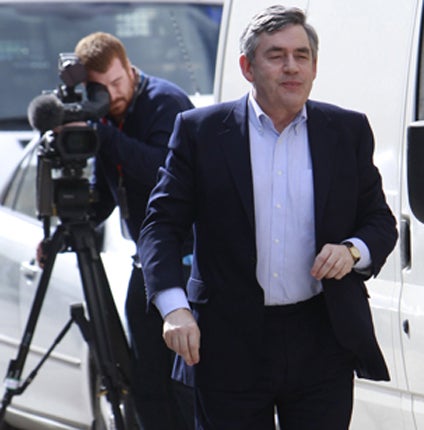Brown's plan to win votes the Blair way
Labour leader's manifesto will feature key hospitals policy he resisted under predecessor.

Gordon Brown will today execute a remarkable personal about-turn as he embraces Tony Blair's pet policy for freeing hospitals from Whitehall control.
The Labour manifesto will commit a Brown government to transferring power over every hospital to local managers, while hospitals that fail to raise standards within three years will be taken over. Mr Brown will insist his government retains its reforming zeal as Labour seeks to reel in the Conservatives' consistent lead in the polls and achieve a fourth consecutive spell in power.
Although the financial crisis means the Labour manifesto will be devoid of major new spending promises, the Prime Minister will place heavy emphasis on the need to continue "spreading excellence" in public services.
The manifesto, to be launched by Mr Brown in the crucial election battleground of the West Midlands, will also commit the party to:
* End long-term unemployment by finding a job for over-25s who have been unemployed for two years and under-25s out of work for ten months.
* Migrant workers will be required to pass an English language test before taking on jobs in the public sector.
* Give suspected cancer patients the right to be tested within a week of seeing their doctor.
* Guarantee train travellers are sold the cheapest tickets available – or get their money back.
The Independent has been told that a commitment to turn all hospitals into foundation trusts by 2015 will be the centrepiece of Labour's manifesto promise to tackle under-performance in the NHS by sharing best practice.
The promise will represent a volte-face by Mr Brown who as Chancellor in 2002 opposed the introduction of so-called foundation trusts by Mr Blair. As Prime Minister, Mr Brown has appeared unenthusiastic about their development. But he will today commit the party to complete the changes begun by Mr Blair. There are 129 NHS foundation trusts in England with a joint turnover of more than £25bn, with another 93 yet to follow.
The Labour manifesto will say: "All hospitals will become foundation trusts (FTs), with successful FTs given the support and incentives to take over those that are under-performing."
A similar idea will be unveiled to raise standards in the classroom, with high-calibre schools encouraged to form partnerships with those struggling to achieve high standards. Groups of parents dissatisfied with the running of their children's school will be able to trigger a ballot on whether a new organisation should be brought in to turn it around. The new owners would be from a list of approved providers, which would include universities, colleges, successful schools and private companies.
Mr Brown will declare in the foreword to the 100-page document that there can be "no return to business as usual" as he sets out plans to make public services more accountable. He will say: "Reform cannot stand still – not least because we need to get more value and delivery from public services in a period of public-spending constraint." The stress on public-service reform will also be seen as an attempt by Mr Brown to switch focus away from Tory taxation and efficiency reforms that dominated the opening electioneering skirmishes.
Labour will campaign heavily in the run-up to polling day on 6 May on its pledge to give suspected cancer patients the right to be tested within a week of seeing their doctor.
A package of constitutional reform will include a promise to hold a referendum on scrapping the first-past-the-post voting system for Westminster elections. Mr Brown has been converted to electoral reform after years of scepticism about its merits.
The Conservative manifesto, to be launched tomorrow, will focus on the theme: "We're all in this together." A Tory source said its message was that central government did not have all the answers and that "only by coming together as a nation can real change come". Following its promises to reverse planned rises in National Insurance contributions and to offer a tax break to 4 million married couples, the party is promising further "agenda-setting ideas". The Tories will pledge to end the "postcode lottery" for out-of-hours care by guaranteeing people access to a local GP 12 hours a day, seven days a week.
They would also ban state officials from entering private homes without a magistrate's warrant, and also restrict powers of entry to cases involving "serious criminal offences" or public safety. The Government had introduced 587 such powers since 1997 despite promises to curb the "snooper state", the party claimed.
Nick Clegg, the Liberal Democrat leader, will today turn his party's spotlight on Labour's record on poverty.
He will release figures claiming that Britain's poorest households are paying a greater proportion of their income in tax than in 1997, while the richest people pay less. According to the Lib Dems' analysis, the poorest 20 per cent of households are paying £107 more tax annually at today's prices, while the richest 20 per cent pay £319 less. Mr Clegg insists that only his party would close the gap, with a £17bn "tax switch" benefitting low and middle income people.
Join our commenting forum
Join thought-provoking conversations, follow other Independent readers and see their replies
Comments
Bookmark popover
Removed from bookmarks